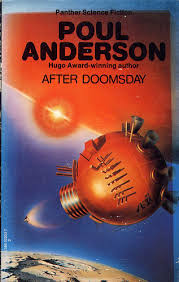In Poul Anderson's After Doomsday, the crews of two interstellar spaceships have survived the genocidal sterilization of Earth. In James Blish's The Day After Judgement, mankind has survived a limited nuclear war. Thus, so far, two futuristic sf novels, each featuring a technological threat to all life on Earth. In Anderson's There Will Be Time, the civilization-destroying nuclear war is called the Judgment War. Thus, Anderson uses the terms "Doomsday" and "Judgment" in two similar secular contexts.
However, what I have not mentioned so far is that Blish's use of the term, "Judgment," is Biblical and apocalyptic. The nuclear exchange was just one aspect of Armageddon, which the demons have won. Thus, we are reading fantasy, not sf. On the other hand, it is what I have called "hard fantasy," reading very much like sf and, if its speculation that eternal life is full negative entropy were to be developed further, then it would return to the realm of sf with the angels and demons scientifically rationalized.
The Startegic Air Command attacks the demon fortress of Dis now manifested in the Valley of Death, Death Valley: science versus the supernatural, a concrete expression of the theme of Blish's After Such Knowledge Trilogy. Anderson presents scientific rationales of fantasy ideas in some works discussed recently on the blog.

1 comment:
Kaor, Paul!
While I agree that "doomsday" and "judgment" were used in a secular fashion in Anderson's AFTER DOOMSDAY and THERE WILL BE TIME, those terms still had Biblical meanings and connotations. It was natural for survivors whose backgrounds and civilization had been so deeply influenced by Judaism and Christianity to use such terms.
Sean
Post a Comment